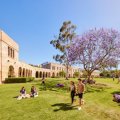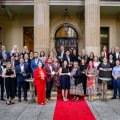Subversive cartoonists in India and South Asia, and a man who led the fight for media freedom in Indonesia are joint-winners of the prestigious University of Queensland (UQ) Communication for Social Change Award for 2010 to be made today.
• The winner of the individual CSC Award, Mr Tosca Santoso, is an internationally-respected media freedom and human rights advocate.
• The 2010 communications organisation award winner, New Delhi-based World Comics India, has brought together grass-roots activists, cartoonists, artists, development journalists and students to produce comics as social-change tools.
The winners will receive their awards this afternoon at an event at the UQ Staff Club, St Lucia at 5pm.
“The 2010 winners demonstrate how simple yet relevant media solutions can be effective and even radical,” the Head of UQ’s School of Journalism and Communication, Professor Michael Bromley said.
UQ’s School of Journalism and Communication launched the annual communication and Social Change award in 2006 to honour outstanding communications contributions by individuals and organisations around the world.
This year there was a strong international field of 17 nominations for the award, which comprises a plaque and $2500 for each award.
Mr Toscano played a leading role in Indonesia’s struggle for an independent and free media during the authoritarian Suharto region in the 1990s. His campaigning led to the establishment of the independent radio news network KBR68H in 1999.
In 2010, KBR68H broadcasts news and community development programs to 720 radio stations throughout Indonesia, 22 million listeners and 10 other Asian countries, including Australia on SBS Radio.
Mr Santoso says the role of KBR68H is to encourage people throughout Indonesia and its remote islands to demand more from their political leaders and contribute to the development of public policy and better government practices.
World Comics India (WCI) creates and distributes poster comics to communicate news, education programs and advocacy messages across disadvantaged communities in India, Nepal, Sri Lanka and even in Europe. Comics are a visual communications tool that transcends class, language, literacy, media access and social class and caste.
WCI works with local NGOs and civil society activists to conduct skills development workshops, often in remote communities, to teach the fundamentals of comics and cartooning design and production so that these communities can tell their own local stories, usually as wall posters.
Campaign achievements include campaigns against the practice of female infanticide and foeticide in Western Rajasthan; against corporal punishment in Indo-Nepali schools; and against child sex crimes in Goa.
Award winners were selected by an independent Award Jury Panel including Peter Cave (Australian Broadcasting Corporation), Anne-Maree O’Keefe (Lowy Institute), Fiona Crockford (AusAID), Hugh Leonard (AIDB), Sylvia Cadena (APNIC), Professor Ken Wiltshire (UQ Business School), and Zala Volcic (UQ Centre for Critical and Cultural Studies)
As well as India and Indonesia, award nominees came from South Korea, France, Iraq, Palestine, Sri Lanka, Bangladesh, Cambodia, Pakistan, Kenya, Japan, New Zealand, and Israel.
The Awards are administered by the UQ School of Journalism and Communication’s Centre for Communication and Social Change.
The fast-growing community development discipline of CSC promotes the use of communication processes, techniques and media to empower people and create the capacity for social dialogue.
Additional information about the winners follows.
Media inquiries:
• Jessica London, Project Officer
Centre for Communication and Social Change
P: 07 3346 3092 | F: 61 7 3346 8299
E: j.london@uq.edu.au | W: www.uq.edu.au/ccsc
• John Austin. SJC Journalist-in-Residence
Ph: 61 7 334 68237 email: j.austin@uq.edu.au
Joint-winners summaries
1. World Comics India
World Comics India (WCI) is an NGO founded in 2002 by New Delhi-based political cartoonist Sharad Sharma.
WCI s a collective of grassroots activists, cartoonists, artists, development journalists and students who develop and promote the use of comics and cartooning as “grassroots” communication for social change tools that empower disadvantaged communities by giving them a “voice”.
WCI promotes the use of “grassroots comics” both in India and worldwide. It defines “grassroots comics” as a visual medium that tells local stories. As a communication tool that transcends the barriers of language, literacy, media access and social class and caste, grassroots comics have been successful in promoting positive social change outcomes in India’s remote and conflict-ridden regions, and also across South Asia.
WCI works with local NGOs and civil society activists to conduct skills development workshops, often in remote rural areas that have poor access to mainstream communications infrastructure. WCI training teaches the fundamentals of comics and cartooning design and production; workshop participants decide what stories they want to tell. Wall posters are the main product of WCI’s training workshops.
Its activities include:
• “Grassroots comics” campaigns. WCI has launched four campaigns: Girl Child Right, Child Right and Paedophilia, Corporal Punishment, and Children’s Participation in Local Governance.
• Training of Trainers program. WCI produces training manuals for the delivery of “grassroots comics” workshops internationally, publishes comic anthologies, and conducts issues-based awareness campaigns.
• World Comics Network. WCI promotes the use of grassroots comics as a tool to promote positive social change globally. It has created small independent comics divisions in Pakistan, Nepal and Sri Lanka, has a presence in Europe (in the UK, Sweden and Estonia) and has also recently introduced the concept in West Africa and Latin America.
• Training workshops. WCI has conducted more than 500 workshops globally and has trained more than 10,000 people in disadvantaged communities to express themselves using the simple “grassroots comics” format.
• International partnerships. WCI works in collaboration with international development organizations in Europe, Africa, South Asia and Latin America. WCI’s partners include Oxfam-GB, UNICEF, Plan, World Vision, Community Pride Initiative (UK), Viracao (Brazil), Jansansadya (Sri Lanka), Save The Children Sweden, Insan Foundation (Pakistan), Plan (Benin), Swedish Comics Society (Sweden) and World Comics Finland (Finland).
HIGHLIGHTS
• Campaign achievements include:
- “Girl Child Right” campaign, which began in 2005 in Western Rajasthan. This region suffers from high rates of infanticide and foeticide (the killing of female children and infants) and child marriage, and many girls go uneducated. Local children and youths created more than 300 “wall poster” comics on female child rights issues, which were distributed to over 100 villages. As a result, community attitudes towards female children began to become more positive, enabling more girls to go to school. The campaign continues through a local initiative, Barmer Comics Manch.
- Corporal Punishment Campaign. Under this awareness campaign, children and youths in towns in Indo-Nepali border districts created over 500 comics on corporal punishment, using slogans such as “Give Up The Stick”. They distributed the comics widely, leading to over 3000 teachers and parents signing an anti-corporal punishment petition and taking an oath not to continue the practice. The children and youths formed a “vigilant committee” to monitor for incidents of “stick punishment”, and have trained 30 “grassroots comics” teachers who continue to produce new comics on the issue.
- Child Right and Paedophilia campaign: Launched in 2006 in Goa, where a tourism boom has increased the incidence of sex crimes committed against local youths and children. More than 200 students from four colleges in Goa produced comics on this issue and distributed them to more than 60 village communities, with the help of local government authorities. The students also formed a campaign group, “Goenkar Changemakers”, which has organized “grassroots comics” workshops in partnership with local organizations.
• WCI has met and excelled in the three objectives outlined for the 2010 Communication for Social Change Award. Mr Sharma’s unique theory and practice of “grassroots comics” has contributed an important tool for communication for social change.
• These grassroots-level initiatives are innovative and practical, which is why they have been able to (be sustained) in areas where the mainstream media often cannot (be sustained).
• WCI’s commitment to communication for social change has developed since 2002.
• Websites and blogs:
http://en.wikipedia.org/wiki/Sharad_Sharma
http://www.worldcomicsindia.com/
http://www.goingtoschool.com/
2. Mr Tosca Santoso
Mr Tosca Santoso is the Managing Director and founder of leading Indonesian radio network KBR68H.
A journalist of 20 years’ standing in Indonesia, Mr Santoso is also an internationally-respected media freedom and human rights advocate who played a leading role in Indonesia’s struggle for media freedom during the 1990s. He coordinated the production of a popular underground political publication, Independen (Independent), which won the 1995 Index on Censorship Freedom of Expression Award.
Prior to launching KBR68H, in 1998-99 Mr Santoso was Executive Director of media freedom NGO The Institute for the Studies on Free Flow of Information (Institut Studi Arus Informasi).
Mr Santoso is recognised as a leading social entrepreneur in Indonesia. In addition to his role with KBR68H the Managing Director of Green Radio, Jakarta-based radio station which specialises in environmental radio journalism, and which also conducts a number of pioneering off-air environmental activities such as a reafforestation program and an ecotourism program.
Mr Santoso is concurrently the Managing Director of TEMPO TV, which is a collaboration between KBR68H and Indonesian print media group TEMPO.
Throughout his career, he has played a leading role in a number of respected Indonesian media organisations. Mr Santoso was the first Secretary General of the Alliance of Independent Journalists (Aliansi Jurnalis Independen/AJI), which he helped to found in 1994 in protest at government censorship. He was a member of the Indonesia Press Council from 2003-2006, and in 2006 he helped found the Indonesian Association for Media Development (Perhimpunan Pengembangan Media Nusantara).
He has received a number of awards for his contribution to media freedom and journalism in Indonesia. In 2006, he became an Ashoka Fellow, and in 2005 won an Asia Foundation Press Award; and in 1995 he received the International Federation of Journalists (IFJ) Rob Bakker Award.
Mr Santoso is a widely-published author and contributor to publications on media freedom in Indonesia. He wrote KBR68H, Gelombang Kebebasan (published in 2006; the English-language edition was entitled Waves of Freedom), and was editor of the book Seni Wawancara Radio (Interviewing for Radio, published in 2000). In the later years of authoritarian rule in Indonesia, he coordinated a team that published “unlicensed” books in defiance of the Government’s censors.
Organisation: Radio News Agency KBR68H, Indonesia
Indonesia’s largest independent radio news agency, KBR68H was founded by Tosca Santoso in 1999. KBR68H has a strong commitment to public service programming, addressing topics that are central to Indonesia’s transition to democracy such as good governance, human rights, regional autonomy, democracy, religious tolerance and pluralism.
It broadcasts via satellite to 720 radio stations in Indonesia, reaching an audience of 22 million regular listeners. KBR68H also broadcasts to 10 other Asian countries. Its flagship weekly regional current affairs program is “Asia Calling”.
KBR68H has more than 120 employees, including around 50 journalists based in Jakarta and 100 correspondents across Indonesia, as well as 30 contributing reporters around the Asian region.
The network’s programs are also re-broadcast internationally on Radio Nederland, Deutsche Welle, Australia’s SBS Radio and the Voice of America.
Under Mr Santoso’s stewardship, KBR68H and its journalists have won a number of awards. For example, the network won the 2008-09 King Baudouin International Development Prize “for its contribution to a sustainable development based on the strengthening of democracy, tolerance and citizen participation, by producing and disseminating qualitative information through a network of local radio stations and by promoting professional ethics in the media world.”
In Indonesia, KBR68H won the 2008 Danamon “Heroes of Society” Award for its work in extending information access to remote parts of Papua, and the Aceh Arts Council’s Tsunami Award for achievements in rebuilding radio stations that were destroyed by the December 2004 Tsunami.
HIGHLIGHTS
• Tosca Santoso is being nominated for the Communication and Social Change award because of the impact he has had on Indonesian society through the remarkable and unique radio news agency he founded in 1999, KBR68H.
• Through KBR68H and related initiatives, Santoso has created a new paradigm for radio in Indonesia, transforming it into an effective, low-cost medium for social change and a tool for building democracy.
• By establishing an effective platform for interaction amongst citizens throughout the country, he is helping to redefine the development process.
• Santoso has pioneered a ground-breaking program to bring information access to some of Indonesia’s most remote and under-developed regions (such as the highlands of Papua). These activities are having an enormous positive impact on the lives of local communities in these regions.
• He devised the idea of an independent news agency in response to the end of over three decades of authoritarian rule, seizing the chance to use the power of radio for the first time in Indonesia, and combining it with internet and satellite technology to effect positive social change.
• KBR68H encourages its listeners to demand more from their political leaders. Its news reports and talk shows have had an impact on public policy, and have been the catalyst for local and national government action to address social, environmental and human rights problems the network has raised.
• Santoso’s innovative approach to using radio as a communication and social change tool is now serving as a model for radio initiatives in other countries, including Nepal and Russia.
• These achievements would be impressive enough, but Santoso has also sought to increase the impact of radio as a tool for development by helping to raise professional standards in the Indonesia media sector. He has organised training programs for thousands of radio staff, to enable them to produce public interest programming of interest and relevance to their listeners.
• Santoso has established a non-profit organisation to manage these training programs, and has pioneered a loan scheme that enables radio stations to access capital at low interest in order to improve the quality of their programs.
• He has also launched a cutting-edge program to build more independent radio stations around Indonesia. To date, 12 of these stations have been built and as a result communities have been transformed, as people have their voices heard, often for the first time, on political, social and economic issues.
• This growing radio station network also allows local communities to engage more effectively with local government, increasing government accountability and transparency in parts of the country that have historically lacked this.
• Santoso was also responsible for rebuilding dozens of radio stations in Aceh after the devastating 2004 Tsunami, and 2006’s major earthquake in Yogyakarta.
Website and other online links:
http://www.ashoka.org/content/ashoka-fellow-tosca-santoso-wins-king-baudouin-international-development-prize
http://www.icfj.org/News/PressReleases/BrazilianInvestigativeReporterandIndonesian/tabid/1659/Default.aspx
http://www.thejakartapost.com/news/2010/06/17/indonesian-receive-press-award-dc.html
http://www.mediahelpingmedia.org/news/asia-pacific/403-indonesian-news-agency-wins-global-award
http://findarticles.com/p/articles/mi_m1309/is_1-2_46/ai_n42723728/
http://www.comminit.com/en/node/303032/2754
http://www.kbprize.org/videos/kbr68h_en.wmv
http://www.mdlf.org/
http://en.wikipedia.org/wiki/Index_on_Censorship
.jpg)









